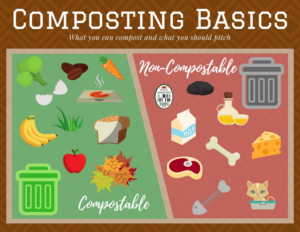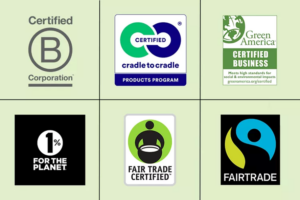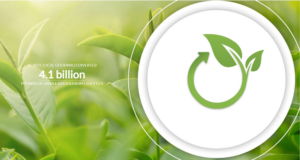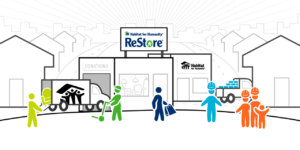Green Back-To-School Tips
Being a college student is a unique time in your life in many ways. It can be tricky to live sustainably when resources are limited and sometimes you feel like you don’t have control over certain aspects of your life. However, it’s also a great time to start forming habits that you will carry on into the rest of your life. Here are some tips on living in a more eco-conscious way as a student. Remember, you don’t have to do everything mentioned in this article and you definitely don’t have to do everything immediately.
General Tips
- Have you heard of Ecosia? It’s a search engine just like Google, Bing, or Yahoo except that 80% of its profits from advertising goes towards supporting tree-planting projects. It’s a free and easy way to help get trees planted by doing something you were going to anyways: using a search engine. It’s completely free and most major browsers have an extension for it.
- Go as paperless as possible. If you can use a computer for it or already have a tablet, those are great resources for taking notes. If you’re like me and can’t kick the habit of using a pen and paper, I recommend trying RocketBook, which is a company that makes reusable notebooks and planners.
- Know what to recycle where! This is important because recycling the wrong things can cause less to be recycled, whether it’s by sending things to recycle that break machinery or just slowing down the recycling process, not knowing what to recycle is harmful to the system as a whole. Here’s some info on what you can recycle on campus, check with Pitt County for other common items and our local Staples for trickier items like pens, electronics, and batteries.
- Composting
 is a great way to help the planet and utilize food waste. It involves letting kitchen scraps turn back into soil in a natural process instead of sending them to landfills to produce harmful greenhouse gasses. But you must make sure that you’re not putting anything potentially harmful for plants or the planet. Some common examples of things to compost are non-citrus fruit or veggie peels, coffee grounds, loose leaf tea, unsalted/unseasoned pasta or rice, pet hair, and shredded cardboard. Never add meat or fish, fats or oils, or anything that might be harmful to plants like charcoal, salty foods, or walnuts.
is a great way to help the planet and utilize food waste. It involves letting kitchen scraps turn back into soil in a natural process instead of sending them to landfills to produce harmful greenhouse gasses. But you must make sure that you’re not putting anything potentially harmful for plants or the planet. Some common examples of things to compost are non-citrus fruit or veggie peels, coffee grounds, loose leaf tea, unsalted/unseasoned pasta or rice, pet hair, and shredded cardboard. Never add meat or fish, fats or oils, or anything that might be harmful to plants like charcoal, salty foods, or walnuts.
- If you live on campus and want to compost, there are bins behind the dining hall.
- If you live off campus and don’t think you can set up your own composting in you living space, you can contribute to the composting at the community garden at 209 Stancil Drive
- I recommend getting a container and compostable bags (make sure they specify “backyard compostable” or “at home compostable”). There are a variety of different types of containers, but the most common are ones that you can keep in your freezer to help reduce the smell and ones you can keep on your counter that generally require a charcoal filter to reduce odor.
- Plants are a great thing to have in your room as they to help purify air and studies show they do many things to boost your mental health. If you’ve never had plants before, no worries! Here’s a great list of indoor plants for beginners which goes into detail what kind of care each plant will need and even lists if they are toxic to cats and dogs.
- Using what you have is always the most sustainable option. Whether that means collecting and using the pens scattered around your house, wearing the clothes in your closet, or using the bookbag you used last year, keeping and using items for as long as you can is one of the best things you can do for the planet
- If you need something you don’t already own, but also don’t see yourself using often or consistently, borrowing those items from a friend, or renting when possible is not only more sustainable, but also better for your budget! Check our university libraries for equipment you might need short-term like digital cameras, phone tripods, or graphic pen tablets.
- For single-use items that you use frequently, there is almost always a reusable option available. Be sure to check the options above to potentially find these things secondhand and check out our July newsletter for more tips on ditching single-use plastics!

The How, What and Where of Sustainable Back-to-School Shopping
If you’ve decided that you really do need to own something, buying used, shopping small, and buying from local businesses are some of the best ways you can contribute to helping your community be more sustainable. If you are unable to find what you need used or locally, my top recommendation is to learn different sustainability certifications and what they mean.
General Shopping
- My Sister’s Closet, My Sister’s Attic, and My Sister’s Place are local stores that sell used clothing, furniture, and housewares. Not only is this shopping secondhand, small, and local, but the proceeds go to a local non-profit, The Center for Family Violence Prevention. It’s a win all around!
 Goodwill is another store where you can find used clothing and various other things you might need in your life from books to lamps to pots and pans. Goodwill is also a non-profit, assisting people in finding jobs and establishing careers.
Goodwill is another store where you can find used clothing and various other things you might need in your life from books to lamps to pots and pans. Goodwill is also a non-profit, assisting people in finding jobs and establishing careers.- Facebook Marketplace is a good resource for buying used and unwanted items from the convenience of your own home.
- Etsy has tons of vintage and handmade items and it also helps to support small businesses. Because they are smaller, it is often harder for them to get official certifications but the more detailed and transparent they are in the item’s description, the better. Etsy also has carbon-neutral shipping for all products bought on its site.
- Earth Hero is a great online resource that is a hub for sustainable brands and products. You can choose from various values (Black and/or women owned, vegan, upcycled, etc.) as well as narrow down their products by uses in your life. If you see something that’s out of stock or wonder if the company sells something similar that isn’t on EarthHero’s storefront, I’ve had luck with hopping over to Ecosia and searching the company’s name to find more products on the company’s website.
- Did you know that you can find a good number of sustainable products at Target? Currently, they mostly have personal care products advertised as sustainable, but they also sell other things with sustainable qualities like organic cotton sheets.
 School Supplies
School Supplies
- Refillable pens or pens made from materials other than new plastic are a good thing to look into as well as erasers made from either natural materials or recycled materials. There are lots of opportunities to consider purchases when it comes to school and office supplies. Both Office Depot and Staples have sections on their website for green purchasing.
- Renting books, whether through the university bookstore or elsewhere, is a good option if you don’t think you’ll care to keep your textbooks and it’s so much cheaper than buying books. There’s also the option of trying to find them used. A great option, especially if you need to buy a textbook new is BetterWorldBooks which is a great company that recycles, reuses, and donates books as well as financially donating money to libraries. Other options for books are ThriftBooks, where you can buy used books online, and Bookshop, where you can choose a local small bookstore to support while shopping online.
Bags
- Terra Thread uses regenerative organic cotton in its wide variety of travel bags and sells everything from toiletry bags to duffel bags.
- Bagito sells various types of bags from reusable zip storage bags to grocery totes made from 100% recycled materials and donates an average of 10% of its sales to environmental education.
- Day Owl is a brand that sells backpacks, collapsible tote bags, and crossbody bags made using recycled plastic.
Electronics & Accessories
- Electronics are something that a lot of people get nervous when considering buying used, but there are websites out there that specifically make sure electronics are working optimally before reselling them. You can also check with brands themselves to see if they have a “refurbished” section in their stores.
- Nimble uses recycled and renewable materials for chargers, screen protectors, and various other tech accessories as well as being part of 1% for the Planet.
- A Good Company and Pela are both companies that make compostable phone cases as well as other sustainable accessories.
Bedding and Furniture
- Try looking for linen, hemp, or organic cotton when buying bedding. Not only are the processes behind making these materials more sustainable than others, but these materials are also more durable and will last much longer than alternatives.
- Pottery Barn Teen has tons of options and a commitment to plant trees, use recycled plastic, and is FSC Certified.
 There are tons of options out there to buy used furniture, but one way to do it with your money going to a good cause is buying from ReStore, which is a store owned by Habitat for Humanity that restores and sells donated furniture.
There are tons of options out there to buy used furniture, but one way to do it with your money going to a good cause is buying from ReStore, which is a store owned by Habitat for Humanity that restores and sells donated furniture.- I mentioned Etsy as a great place to shop in general earlier, but I also want to highlight that they have an entire section of their website dedicated specifically to reclaimed furniture. There you can find everything from restored vintage furniture to furniture made from materials that were considered waste.
- Viva Terra is a shop that sells handmade furniture made from reclaimed, recycled, and natural materials.
Clothes
- Good On You Directory is a great resource when shopping for new clothes to avoid companies that may be making false sustainability claims or when looking for new, sustainable brands and companies.
- TenTree plants ten trees for every purchase as well as offering a carbon offsetting program where people can purchase different packages to offset their carbon footprint for different events and activities.
- For Days is a company committed to contributing to a circular economy. They accept clothing that is too worn to donate and recycle it to make their clothing.
Personal Hygiene
- Hygiene and skincare are some areas with the most options available, so I encourage you to do some research to find what works for you, but here are a few of my favorites:
- Dr. Bronner’s is a company that sells castile soap, hand sanitizer, lotion, and more staples that are made from sustainably grown, natural ingredients.
- Ethique has a focus on plastic-free products sold in solid forms, some of which are formulated to be used as they come, and others made to be diluted with water.
- Plaine is a brand that sells products in aluminum bottles that customers then return for the company to refill, reusing the bottles instead of putting the responsibility on the customers and recycling systems.
Cleaning Supplies
- Grove Collaborative is a company that both has its own natural, sustainable cleaning supplies and offers products from various other companies on their website that share their values of making the world a greener place.
- Blueland works to reduce its overall impact on the environment both by reducing single-use plastic and by shipping concentrated products, which means less weight and space per product and thus fewer vehicles needed to ship their products.
- Dropps specialized in laundry and dish cleaning, making cleaning pods made from all-natural ingredients sold in plastic-free packaging.